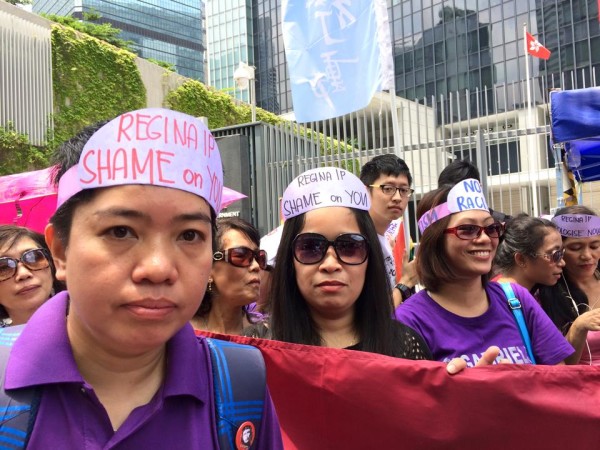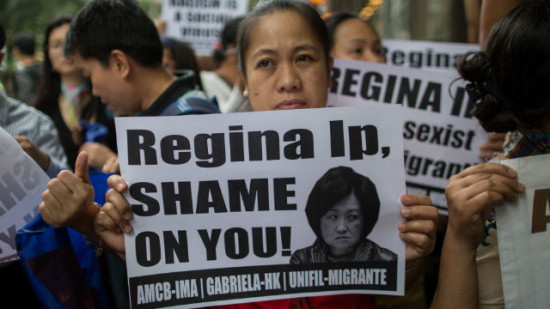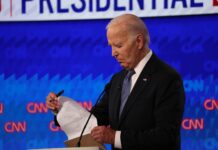Hong Kong Exco member forced to apologise for racist slur on Filipino migrant workers
Sally Tang Mei-ching, Socialist Action
The affair surrounding the racist outburst by Executive Councillor Regina Ip Lau Suk-yee shows the growing confidence of migrant workers to protest and challenge Hong Kong’s capitalist elite. Ip, who is chairman of the pro-government New People’s Party, eventually issued an apology on 25 April, several days after she made headlines with racist and sexist remarks in a Chinese-language newspaper column against migrant domestic workers from the Philippines. Ip’s recantation cam only after numerous protests organised by migrants and their supporters.
In her newspaper article, Ip said she had received complaints from “foreign women” living in Hong Kong that the government was “allowing Filipino domestic helpers to seduce their husbands”. Her article went on to describe the women as “sexual resources” for Westerners. Similar racist content was carried on Ip’s facebook page, although this was later removed.
The reaction from the city’s Filipino community was swift. On 23 April, migrant groups protested outside the headquarters of the New People’s Party, chanting “Regina Ip, Shame on you”, and “Racism is a social virus”. A spokesman for the Asian Migrants’ Co-ordinating Body, Eman Villanueva, said Ip’s remarks had offended 170,000 Filipino domestic workers in Hong Kong. The following day, Ip who is widely expected to run for the post of Chief Executive in the (rigged) elections of 2017, issued an apology, while still insisting her remarks were neither racist or sexist. But this, given her earlier refusal to take back her racist comments, failed to cool the anger among migrant domestic workers. Several hundred took to the streets again on Sunday 26 April, rejecting the apology as hypocritical.
Stella, working in Hong Kong for six years, told Socialist magazine: “What she said is racist, makes me very angry. I have read her apology, it’s totally not sincere or honest. It’s just because she felt pressure, she’s trying to end the affair.” Christina who came four years ago, said angrily: “I came to Hong Kong just to make a living, to earn money to feed my family! Not to seduce my boss!” Christina is afraid that Ip’s speech will create a negative impression about Filipino migrants.
Regina Ip’s track record
The latest controversy follows a history of Regina Ip supporting anti-labour and anti-democratic causes been notorious, and this is not the first time she has attacked the rights of foreign domestic helpers. Furthermore, as the former Hong Kong Secretary for Security, Ip’s remarks give an accurate reflection of the outlook of government officials, shaped by elitism and arrogance towards the working class. Ip was one of many establishment politicians who opposed the right of abode for foreign domestic workers when the current racist immigration rules were being challenged in the courts. She urged the government to request China’s National People’s Congress (fig-leaf ‘parliament’) to give a ruling to solve the problem, which for right-wing politicians like Ip also serves a double purpose as a way to strengthen the Chinese dictatorship’s control over Hong Kong’s nominally independent legal authority.
She has also advocated the establishment of a “trial period” for foreign domestic workers of three months in which time the employer would have the right of summary dismissal, with the required paid notice cut from one month to seven days. In 2011, she supported proposals that employers’ requirement to pay the medical expenses for foreign domestic workers should be capped.
Article 23
Previously, Ip has also made highly exaggerated claims about Hong Kong being overwhelmed by immigrants from mainland China. As the Secretary for Security in 1999, she opposed the right of abode for mainlanders born out of wedlock to a Hong Kong parent, making the wildly inaccurate prediction that within a decade 1.67 million people from mainland China would emigrate to Hong Kong. Actual migration during the period was less than half the level she claimed.
She is most well know, of course, for her strong push during 2003 as the Secretary for Security to implement the draconian Article 23, a national security law that would gag criticism of the Chinese dictatorship and impose sever restrictions on political freedoms in Hong Kong. The legislation was stopped by a massive protest movement and Ip was forced to resign. After last year’s mass umbrella movement during she was a vocal supporter of a tougher police response and has recently spoken up again for resurrecting Article 23.
There are important lessons form this episode. Organisations representing migrant workers did the right thing to quickly and clearly come out not only through the media but by organizing collective action and protests. This is the best way to expose racist politicians and build anti-racist support.
It is clear that Ip’s attack on Filipino migrants is linked to unease within the ruling elite over recent victories for the migrant struggle, most notably in the case of Indonesian domestic worker Erwiana Sulistyaningsih, whose employer was jailed for six years for serious abuse. The Erwiana case saw an upsurge in activism by migrants and widespread sympathy from Hong Kong people. The establishment clearly fears this growing self-confidence and willingness to fight for migrants’ rights and can be expected to launch new attempts to turn the tables.
Unfortunately, another less positive feature of this affair is that once again most Hong Kong political parties, even the ones that claim to support democracy, refuse to lift a finger to oppose racism (aside from some comments to the media) and for fear of “losing votes” have never actively supported migrant workers’ rights. This lack of a working class and internationalist approach is also a reason why the pan-democratic parties have been incapable of effectively fighting for democracy in Hong Kong and challenging capitalist interests and the Chinese dictatorship.





